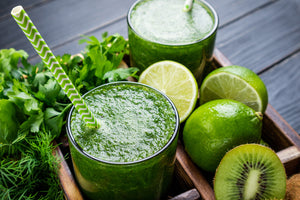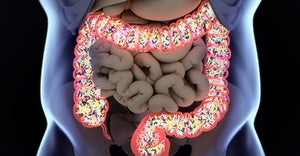Step Into the Fall Season with Collagen

The fall season - what’s not to love? Warm drinks, pumpkin patches, and holidays with loved ones. Oh, and dry skin and achy joints.
There may be a way to enjoy all the good parts of fall without the bad parts. Studies show that supplementing with collagen peptides may help.
Up to 30% of the protein in our body is naturally produced collagen [1]. The word collagen is derived from the Greek word “kolla”, which means glue. Collagen can be interpreted as the “glue” that holds our body together and constitutes, along with the bones, most of the body’s structural support [2].
Unfortunately, our bodies start to lose collagen around 18 to 29 years of age. At the age of 40, the body can lose around 1% of its total collagen per year. At age 80, collagen production can be 75% lower compared to young adults. Collagen loss is a byproduct of natural aging, but can be accelerated by free radicals from unhealthy diets, sunlight, environmental pollution, smoking, alcoholism, and disease [3-4].
Studies have shown that supplementing with bioactive collagen peptides can reverse this age-dependent collagen loss and can be incredibly beneficial for the body [4]. Collagen helps to strengthen our bone, tendons, and cartilage, and can improve the health and appearance of our hair, skin, and nails.
Benefits of high-quality collagen peptides [1]:
- Increase bone density, mass, and quality
- Reduce osteoarthritis symptoms (pain and stiffness)
- Reduce risk of fractures
- Improve skin elasticity, thickness, and hydration
- Improve nail health and reduce brittleness
- Reduce wrinkle formation
- Reduce cellulite appearance
- Improve joint, cartilage, tendons, and ligament health
- Reduce post exercise joint pain in young athletes and improve ankle stability
- Improve blood pressure
- Improve muscle strength and gastrointestinal tract health
- Improve hair quantity and quality
It is possible to get collagen from whole-food, protein sources. However, many individuals, especially the elderly, do not consume enough adequate protein. Even those who do consume adequate protein do not digest it optimally and often do not eat those foods with the highest concentrations of collagen – animal skins, bone broth, and tendons [1].
Research suggests that supplementing between 2.5 to 15 grams of collagen peptides per day can lead to the health benefits listed above [5]. Those who need higher amounts in that range include athletes, aging individuals, those recovering from injury, and menopausal women not on hormone-replacement therapy [1].
In powder form, collagen peptides are convenient and easy to incorporate into a diet. It can be sprinkled into smoothies, shakes, coffee, tea, lemonade, yogurts, dips, salad dressings, soups, sauces, mashed potatoes/cauliflower, casseroles, and desserts [1].
It is no surprise that collagen peptide powders are becoming more popular. With the glut of products on the market, it is essential to choose high quality, well-researched collagen peptide blends. Specific brands, like Whole Body Collagen by Designs for Health, contains a research-proven specific molecular weight collagen peptide formula produced to optimize their beneficial properties [1].
It is important to note that collagen peptide supplements must be complemented by other supportive bone nutrients in the diet and/or supplementation to support healthy bones: Calcium, magnesium, silicon, and vitamin D, K1 and K2 [1].
So, this fall season, let’s do something different.
Let us lower our need to apply skin care products for dry skin and over-the-counter remedies to relieve our body aches. Instead, let us improve and maintain proper collagen levels in our body to directly support our body’s bones, joints, skin, hair, and nails at the source. Consider stepping into fall with some collagen peptides this year.
References:
- Paul C, Berger A. Whole Body Collagen. Designs for Health Website. Published August 2018.
- Deshmukh SN, Dive AM, Moharil R, Munde P. Enigmatic insight into collagen. J Oral Maxillofac Pathol. 2016;20(2):276-283. doi:10.4103/0973-029X.185932
- León-López A, Morales-Peñaloza A, Martínez-Juárez VM, Vargas-Torres A, Zeugolis DI, Aguirre-Álvarez G. Hydrolyzed Collagen—Sources and Applications. Molecules. 2019;24(22):4031. doi:10.3390/molecules24224031
- Bolke L, Schlippe G, Gerß J, Voss W. A Collagen Supplement Improves Skin Hydration, Elasticity, Roughness, and Density: Results of a Randomized, Placebo-Controlled, Blind Study. Nutrients. 2019;11(10):2494. doi:10.3390/nu11102494
- Paul C, Leser S, Oesser S. Significant Amounts of Functional Collagen Peptides Can Be Incorporated in the Diet While Maintaining Indispensable Amino Acid Balance. Nutrients. 2019;11(5):1079. doi:10.3390/nu11051079
- Tags: collagen joint health skin health
- Dr. Brady







Comments 0